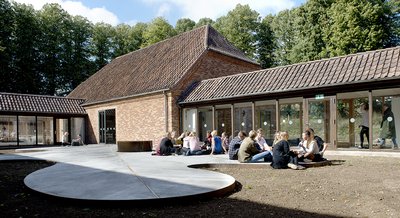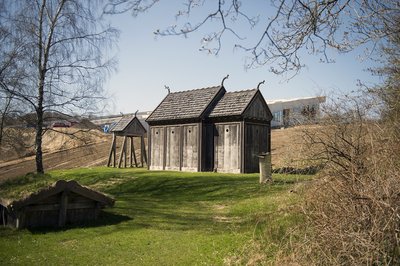| About the programme Language: English (See language requirements) | Place of study: Aarhus | Commencement: August / September (no winter intake) |
The MA programme in sustainable heritage management (SHM) at Aarhus University provides you with the knowledge and competencies needed to meet the multiple challenges of contemporary heritage policy, management, and research.
Working with cultural and natural heritage means being conscious of, and taking responsibility for, the links between humans, our environment, and what remains from the past. The Sustainable Management programme equips you, through engaging with theory and best practice, with the skills necessary to work in the exciting, expanding, and increasingly complex field of heritage. You will be trained in a uniquely interdisciplinary environment to understand, designate, assess, retain, and sustain heritage and to develop, revise, and innovate the future shapes of the sector.
In your second year of the Sustainable Management programme, you have the option to apply and develop your knowledge and skills in practice through an internship; so far our students have gained experience in areas as diverse as archives, museums, cultural agencies, historical reenactment, television, and cultural institutes interning around the world including in Denmark, Finland, France, Greece, the UK, the Caribbean, South Korea, and Bali. In the final semester you will specialize, with an appropriate supervisor, to complete a substantial piece of research on an area of heritage that most interests you.
The Sustainable Heritage Management programme qualifies you to analyse and ethically respond to the demands of heritage work, providing not only a sophisticated intellectual framework, but also a practice-based set of skills. You will learn to tackle the future challenges of heritage management on local and global scales. The questions and challenges are manifold:
Heritage studies and heritage management is a highly interdisciplinary field, involving methodologies and approaches from various disciplines. The Sustainable Heritage Management programme at Aarhus University is anchored in an interdisciplinary research environment that includes engaging with scholars who work in archaeology, anthropology, geography, intellectual history, aesthetics, museology, cultural studies, and digital design.
Thus, during your studies, you will not only work with material forms of cultural heritage, but also with textual data, intangible culture and, not least, people and their various perceptions of heritage. The programme revolves around and intersects with the revamped Moesgaard Museum (situated south of Aarhus), affording unique collaborative opportunities for students and staff in this university-museum environment.
Watch this video presentation by Andres Dobat (Associate Professor in Archaeology)
Bachelor’s degrees in the following subjects qualify applicants for the Master’s degree programme in sustainable heritage management:
Other qualifications can provide admission to the Master’s degree programme, provided the university assesses that their level, extent and content correspond to the degrees mentioned above. The corresponding degree should as a minimum include 45 ECTS credits within the field of cultural heritage studies (for instance, museology, museum studies and heritage production or administration), or from a field allied to cultural heritage studies.
Since English is the language of instruction in all subjects, all applicants are required to provide evidence of English B (Danish upper secondary school level).
Read how to document your language qualifications
2017: No limitation on intake
From 2018, only 35 seats will be offered.
Selection criteria
As the Master’s programme only admits 35 students each year from 2018, meeting the admission requirements does not in itself guarantee admission to the programme.
(The number of seats is a guideline only and may be subject to changes by the university).
If more qualified applicants apply than the number of available places, the qualified applicants will be prioritised according to the following criteria:
In addition to the general documentation requirements, a statement of relevance and a CV – both in English – must be uploaded to your application.
As a student it is important to know the regulations for your chosen subject: what is the content, how is it structured and what does it require from you. You can find this information in the academic regulations.
In the following graphical presentation of the subject, you can see the different modules and courses that, in addition, link to the course catalogue where you can read the course descriptions.
Students of Sustainable Heritage Mangement can specialise by choosing a profile course, a project placement, or a period of study abroad:
The Sustainable Heritage Management program is based at the Department of Archaeology at Moesgaard, an eighteenth-century manor house newly equipped with state-of-the-art facilities that also houses the Department of Anthropology. Here you will have access to a library, computers, a common room, lounges, and a cafeteria, as well as the internationally renowned archaeology and anthropology museum, MOMU, and the surrounding hundred hectares of beautiful fields and woodlands leading down to the sea.

Photo: media Moesgaard
You also have plenty of opportunities to take an active part in student life at the Department of Archaeology and Heritage Studies:
In addition, there are many other events for students at the Faculty of Arts and Aarhus University in general – e.g. lectures, intro days, career days, seminars, celebrations, and sports days.

Photo: media Moesgård
Campus Moesgaard is a unique place. It includes the Moesgaard Library, which is a joint library for Anthropology and Archaeology as well as the Moesgaard Museum. The library is primarily stocked with materials useful to students and staff members at Moesgaard. You will find study space in the library, including study space reserved for students writing their thesis. You will also have the opportunity to see many changing exhibits at the Moesgaard Museum during your time here. As a student at Moesgaard, you can access the museum for free by showing your valid student card.
MoCa Mates connects new international students and senior Master’s students, with the purpose of sharing experiences of studying at Moesgaard and living in Aarhus as a foreign student. The Mates meet up on a weekly basis (at least during the first few weeks), and function as an informal and social forum for student-to-student discussions. Furthermore, the MoCa Mates programme closely collaborates with the student counsellors, to whom the Mates can address certain issues if necessary.
As the second-largest city in Denmark, Aarhus is a young and dynamic place with plenty of opportunities. The 40,000 students at the university make up 17.5% of the city’s population, which leaves its mark on city life. An attractive feature of Aarhus is that there are beaches and woods a short bike-ride away, as well as cultural events taking place throughout the year, including the Aarhus Festival in September. The theatres in the city and the ARoS international art museum offer many events that enable you to experience the Danish culture.
Why choose Aarhus? See studyguide.au.dk and get all practical information about being an international student.
-experienced, photographed, and filmed by the students themselves.
With thousands of pictures #AUInternational, #AarhusUni gives insight into the everyday life as a student at AU; the parties, procrastination, exams and all the other ways you’ll spend your time at university.
The photos belong to the users, shared with #AUInternational and #AarhusUni.
The chart shows the five most common types of work for graduates 1-2 years after finishing their degree. The data is derived from a survey made by Epinion for the Ministry of Higher Education and Science and Aarhus University in 2020.
Graduates in Sustainable Heritage Management are qualified for a number of job markets and industries, depending on area of interest and specialisation. Recent graduates are working in the community, museum and archival sectors, in planning and development agencies, and in bodies within resource management and capacity building, as well as in tourism and the artistic and creative industries.
Many of the challenges that you will be trained to meet are transnational and international in scope. Here are some of the fields SHM graduates typically go into:
In the museum, library, and archival sectors, graduates take up positions related to the responsible handling, conservation, and safeguarding of finds and sites, as well as in more outreach-oriented roles on innovative, inclusive and user-centred communication strategies and schemes.
Furthermore, a MA in sustainable heritage management qualifies students who wish to pursue a research career to apply to Ph.D programmes at Aarhus University or elsewhere, an option that may include collaboration with national or international institutions, organisations or private companies. Find out more information about PhD degree programmes at the Faculty of Arts.
Please contact the Student Counselling Office for advice about employment opportunities and the subject profile options of your degree programme.
You can read more about the career services that are available from Arts Karriere who provide information about employment opportunities as well as arranging various events and workshops.